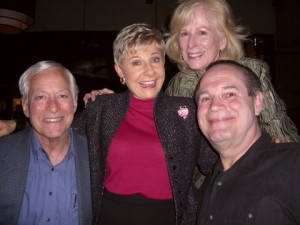The late comedy impresario John Cantu knew that speakers mustn’t be the heroes of all their stories. Together, we analyzed one of his speeches and found sixty-two different people! Learn from great books, plays, and films. Fill your speech with exciting characters, real and imaginary.
What does Hollywood do to make characters even more alive? The writers add reasons for us to “root” for the people in the movie, even if we would not in real life.

In Analyze This (1999), Robert De Niro is a mob boss who orders people killed. Yet, in the end, he gets only three years in prison. Why? Because he is likable. How can you like a killer? Because Hollywood builds in the “likability factor.” He has frailties just like us. He likes Billy Crystal’s character, the psychiatrist. We like people who like people we like. He makes us laugh. Yes, you’ve got it. We like people who make us laugh. The audience ends up pulling for him, despite his flaws.
This is true of all bad-boy anti-heroes, from Bogart to rap stars. In The King’s Speech, the lead character is someone we rarely relate to: a monarch who is technically rich and powerful. Yet, we are shown the enormous vulnerability of the reluctant royal and rejoice at his personal triumph and bravery. We like him!
If Hollywood techniques can make audiences like a vicious killer and a remote King, surely the same techniques can get them on your side too. Build this likability into your characters. Start by identifying the values, needs, and wants of your audience. Then tell them about characters that also share them.
My audience at the Governor’s Conference for the State of Maryland was made up of government employees. Like their counterparts in corporate America, many were feeling under-appreciated. “The best thing about performance excellence on the job,” I said, “is that you take it home, and it affects your family life. One of my friends is an everyday hero like you.” I told them about Bobby Lewis, a proud father who took his two boys to play miniature golf.
“How much?” he asked the ticket taker.
“$3 for adults and for any kid older than six. Free for kids younger than six.”
“Well, Mikey is three and Jimmy is seven, so here’s $6.”
“Hey, mister,” the attendant sneered. “You like throwing your money away? You could have told me the big one was only six. I wouldn’t have known the difference.”
“Yes,” Bobby replied, “but my children would have known the difference.”
The 2,000 people in that audience broke into spontaneous applause. Why? Because that simple story, told with dialogue and a dramatic lesson learned, represented their values: that it’s not what you say you believe that counts; it’s what you model, encourage, reward, and let happen. Did I know they were going to applaud? No. Did I wait and let them enjoy it? Yes.
Here’s a Frippercize: Count how many characters appear in your speeches. They are what make a Hollywood production–flesh and blood personalities that the audience can relate to.
Learn more about public speaking at Patricia Fripp’s June 24 Speaking School.

